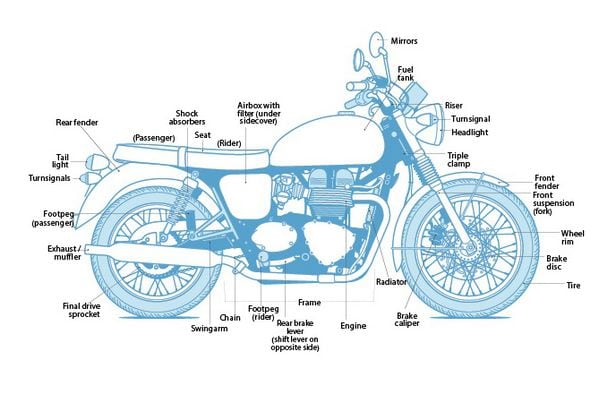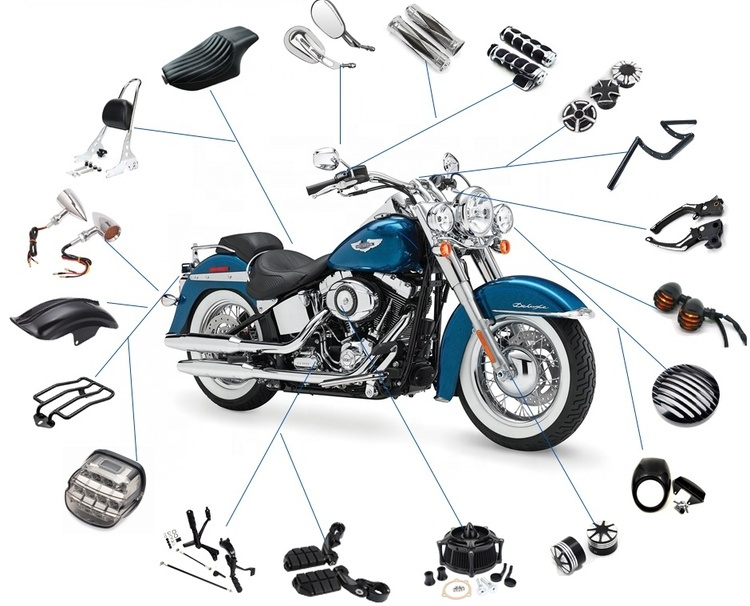A Deep Dive Into Performance Tuning with Bike Parts Wellington
A Deep Dive Into Performance Tuning with Bike Parts Wellington
Blog Article
Discover the Necessary MotorBike Components You Required for Optimal Efficiency
Understanding the vital parts of a bike is fundamental for accomplishing peak efficiency. Each component, from the engine to the stopping system, plays a critical duty in total capability and safety and security. Normal upkeep can avoid unforeseen failures and enhance the riding experience. Numerous bikers overlook the details of these systems. Uncovering just how they interact can lead to a more effective adventure. What crucial elements should every biker focus on?
The Engine: The Heart of Your Motorcycle
The engine acts as the core element of a bike, driving its efficiency and specifying its abilities. It is accountable for converting gas into power, which powers the bike ahead. Various types of engines are used, consisting of single-cylinder, V-twin, and inline setups, each offering distinct qualities fit for various riding designs and objectives. The engine size, generally determined in cubic centimeters (cc), substantially influences performance, with larger engines usually supplying even more power and torque.Furthermore, the engine's layout and innovation, such as fuel shot systems or air-cooling versus liquid-cooling, impact effectiveness and reliability. Upkeep is crucial for peak procedure; elements like regular oil modifications and monitoring ignition system assurance durability. Cyclists usually take into consideration an engine's responsiveness and level of smoothness, as these attributes boost the total riding experience. Eventually, the engine continues to be a critical element that specifies not only the motorbike's efficiency however additionally the motorcyclist's link to the equipment.
The Transmission: Shifting Gears Smoothly
The transmission plays a vital role in a motorbike's performance, specifically in the auto mechanics of equipment moving. Understanding exactly how to move gears efficiently can improve the general riding experience, while regular maintenance assurances peak capability. Proper focus to these facets can considerably impact the longevity and performance of the motorbike.

Equipment Shifting Mechanics
Smooth equipment shifting is vital for optimal motorbike performance, considerably influencing both velocity and control. The technicians of gear shifting entail the interaction between the clutch, gear lever, and transmission system. When a biker engages the clutch, it disengages the engine from the transmission, permitting an equipment adjustment without damaging the components. A well-timed release of the clutch, incorporated with accurate motion of the equipment bar, promotes a smooth adjustment between equipments. This process assures that the engine runs within its best power band, boosting efficiency. Oem Parts New Zealand. Furthermore, understanding the gear ratios and their impact on rate and torque can assist motorcyclists make informed options during changes, eventually adding to an extra satisfying and receptive riding experience
Maintenance Tips Significance
Routine maintenance plays a necessary function in assuring that the transmission system runs effectively, enabling smooth gear changes. Consistently changing the transmission and checking fluid is vital, as old fluid can result in raised friction and wear. In addition, inspecting the clutch for wear warranties peak interaction and disengagement, preventing slippage throughout equipment modifications. Lubrication of relocating parts is equally important to decrease rubbing and improve performance. Motorbike owners should likewise keep an eye on for leakages and unusual noises, as these can indicate underlying problems. By adhering to these maintenance suggestions, cyclists can prolong the life expectancy of their transmission system, guaranteeing that gear shifts remain smooth and adding to the total performance of their motorcycle.
The Braking System: Ensuring Safety on Every Adventure
Braking systems are essential parts that straight affect a motorbike's safety and security and efficiency. They contain different parts, consisting of brake pads, blades, calipers, and hydraulic lines, all functioning with each other to assure effective slowdown. The kind of braking system-- normally either disc or drum-- affects responsiveness and stopping power.Regular upkeep is vital to copyright peak performance; used brake pads can lead to reduced performance and raised quiting ranges. Furthermore, the quality of brake liquid ought to be kept an eye on, as it can take in moisture with time, compromising braking efficiency.Riders should additionally consider the relevance of anti-lock braking systems (ABDOMINAL MUSCLE), which prevent wheel lockup during abrupt quits, improving total safety and security. Effectively functioning brakes are not just regarding stopping; they instill self-confidence in the rider, allowing for more secure navigating through numerous surfaces. Eventually, a reliable stopping system is vital for taking pleasure in every experience with assurance.
The Suspension: Enhancing Comfort and Control
A well-functioning suspension system significantly adds to a motorcycle's general performance, matching the effectiveness of the stopping system. The suspension plays a substantial function in taking in shocks from unequal surface areas, guaranteeing a smoother trip while preserving tire call with the road. This contact is necessary for both stability and control, enabling riders to browse edges with confidence and precision.Different kinds of suspension systems, such as telescopic forks or mono-shocks, offer differing levels of comfort and handling. Correctly tuned suspension improves responsiveness, providing the rider with a much more connected feeling to the motorbike. Routine upkeep checks are essential to identify the suspension components, consisting of springs and dampers, are working at their ideal. An efficient shock absorber not only boosts the riding experience however additionally adds to the longevity of other motorbike components by lessening damage. Because of this, purchasing quality suspension is essential for any type of major motorbike enthusiast.
The Tires: Linking You to the Roadway
Tires play an essential role in a motorcycle's performance, working as the main link in between the roadway and the cyclist. Comprehending the various kinds of tires readily available can greatly impact handling and safety. Furthermore, routine maintenance is essential to guarantee peak tire efficiency and long life.
Tire Types Explained
How do various tire types affect a motorbike's efficiency? Tire types play an important function in determining a motorcycle's security, handling, and grip. Sporting activity tires, developed for high performance, deal enhanced grip and responsiveness on paved roadways, making them perfect for racing and hostile riding. Conversely, touring tires focus on sturdiness and comfort, supplying a smoother experience for long-distance traveling. Off-road tires, identified by their tough tread patterns, excel in grip on unpaved surfaces, ideal for experience enthusiasts. Furthermore, dual-sport tires blend qualities from both on-road and off-road categories, catering to flexible riding demands. Ultimately, choosing the right tire type is vital for enhancing performance, ensuring safety, and improving the overall riding experience.
Maintenance Tips Offered
While riding when driving, preserving excellent tire problem is crucial for safety and security and efficiency. On a regular basis checking tire stress is essential, as under-inflated tires can result in inadequate handling and boosted wear. It is recommended to check step deepness frequently; used tires concession hold and security. Furthermore, cyclists should seek indicators of damage, such as fractures or bulges, which can suggest the demand for substitute. Revolving tires regularly assures even put on, enhancing long life. Moreover, keeping tires clean from debris and staying clear of too much visuals can extend their life expectancy. Preserving proper alignment and balance contributes to peak efficiency, lessening stress and anxiety on other bike elements. Complying with these upkeep suggestions will considerably enhance the total riding experience.
The Gas System: Fueling Efficiency and Performance
The gas system plays a crucial role in maximizing a motorbike's performance and effectiveness, as it guarantees the optimal delivery of fuel to the engine. It makes up a number of essential components, consisting of the gas storage tank, gas pump, fuel filter, and fuel injectors or carburetor. Each part has to operate https://www.moto1.nz/collections/parts properly to assure a smooth and effective ride.The gas tank stores fuel and provides it to the engine using the gas pump, which generates the needed stress. A gas filter stops impurities from getting in the engine, while the injectors or carburetor mix fuel with air for combustion.Proper upkeep of the fuel system is essential; a clogged up filter or malfunctioning injector can result in reduced performance and increased gas consumption. By validating that the gas system runs successfully, bikers can take pleasure in enhanced throttle feedback, far better gas economy, and generally improved riding experience.
The Electrical System: Powering Your Adventure
An effective electric system is important for the general functionality and safety and security of a motorcycle, as it powers critical elements such as the ignition, illumination, and various digital systems. This system consists of the battery, which shops energy, and the generator, liable for generating power while the engine runs. The wiring harness connects these parts, making certain trusted power distribution.Additionally, merges protect the system from overloads, while relays help regulate high-current devices with low-power signals. A well-maintained electric system boosts efficiency by making certain smooth begins and constant procedure of signals and lights, essential for cyclist presence and safety.Regular checks of the battery's cost and connections are essential for stopping electrical failings. Cyclists must also check electrical wiring for damage, making sure all components work preferably. Eventually, a durable electric system contributes significantly to the general performance and integrity of the motorcycle.
Often Asked Inquiries
Exactly how Frequently Should I Replace My Bike's Battery?
The frequency of motorbike battery substitute relies on usage and upkeep (Bike Parts Wellington). Generally, batteries ought to be replaced every three to five years. Routine checks can assist identify when a replacement is essential for peak efficiency
What Tools Do I Need for Basic Bike Maintenance?
For fundamental motorcycle maintenance, one needs necessary tools such as a socket collection, wrenches, screwdrivers, pliers, tire stress gauge, and a torque wrench. These devices help with effective maintenance and ensure the motorcycle runs successfully and securely.
Just How Can I Enhance My Motorcycle's Aerodynamics?
To boost bike the rules of aerodynamics, one need to take into consideration changing fairings, making use of windscreen extensions, enhancing body setting, and lowering general weight. These alterations aid reduce drag, enhancing stability and gas efficiency throughout trips.
What Are the Indications of a Failing Electric System?
Indicators of a failing electrical system consist of lowering lights, difficulty starting, uneven instrument analyses, and blown fuses. Motorbike Components NZ. Uncommon smells or corrosion around battery terminals might additionally show underlying concerns requiring prompt interest for security and performance

Exactly how Do I Pick the Right Oil for My Motorbike?
When choosing oil for a bike, one ought to take into consideration the supplier's requirements, viscosity rankings, and the kind of riding. In addition, standard versus artificial oil can affect performance and engine protection, affecting the decision substantially. The engine dimension, generally gauged in cubic centimeters (cc), substantially affects performance, with bigger engines usually giving even more power and torque.Furthermore, the engine's design and innovation, such as gas injection systems or air-cooling versus liquid-cooling, impact performance and dependability. A well-functioning suspension system substantially contributes to a motorbike's general performance, enhancing the effectiveness of the braking system. The fuel system plays a vital function in making best use of a motorcycle's efficiency and effectiveness, as it guarantees the optimal delivery of fuel to the engine. A gas filter avoids impurities from getting in the engine, while the injectors or carburetor mix gas with air for combustion.Proper upkeep of the gas system is essential; a clogged up filter or malfunctioning injector can lead to decreased performance and boosted gas intake. A properly maintained electric system boosts performance by guaranteeing smooth starts and regular procedure of signals and lights, essential for cyclist visibility and safety.Regular checks of the battery's charge and links are crucial for avoiding electrical failings.
Report this page